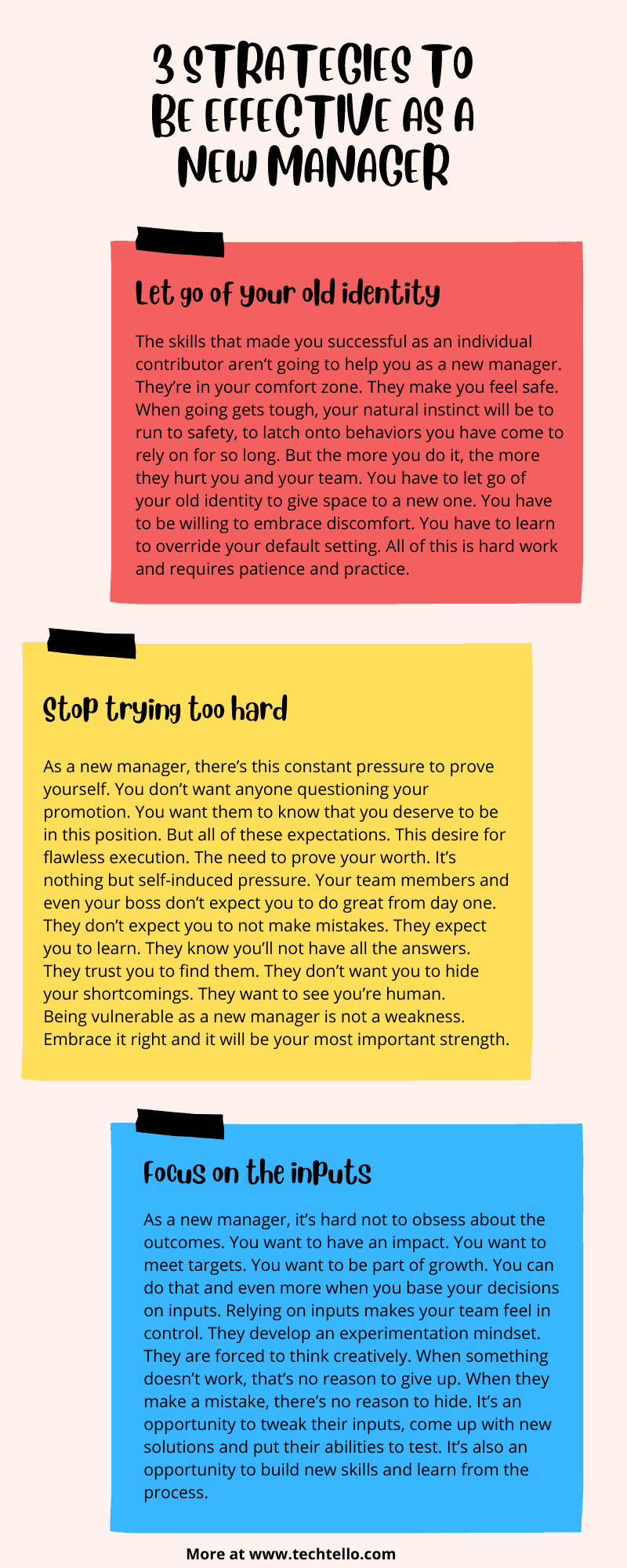Finding It Hard to Be Effective as a New Manager? Here’s How to Succeed

When you get promoted to a new manager, there are lots of questions in your mind. How do I make sure I am good to my people? How do I get to be successful? What if I screw up? What if others find me incapable? Who can I trust? Who can I ask for help? How should I prioritize? What will be the impact of saying no to someone?
With so many questions unanswered, it’s completely natural to feel unprepared. Your struggles are real. When you started as an individual contributor and got to a lead position, you thought you made it. But now as a manager, you are back to square one.
Many people will tell you that you can do better as a manager if you get formal training. But management doesn’t work that way. You can’t learn how to be an effective manager through a few days of training. Yes, knowledge can help you separate right from wrong. But without practicing it yourself, it’s just theory. There are hundreds of books, videos, and podcasts on the topic. Information on what makes an effective manager isn’t the problem.
Most of what looks good in theory doesn’t work out in practice. Every decision you make will be different. Every situation you face will be unique. When faced with a difficult situation, it’s likely you’ll forget everything that you have learnt. Unless you make the mistakes and face the unpleasantness of your failures, unless you feel the brunt of your decisions, and unless you receive criticism, you can’t get better.
You’ll need to acquire a set of skills that can only come through practice. James Clear says in Atomic Habits “Ultimately, it’s your commitment to the process that will determine your progress.” In other words, your process will determine where you end up.
Here are the 3 strategies to be effective in your role as a new manager.
3 strategies to be effective as a new manager
1. Let go of your old identity
The skills that made you successful as an individual contributor aren’t going to help you as a new manager. They’re in your comfort zone. They make you feel safe. When going gets tough, your natural instinct will be to run to safety, to latch onto behaviors you have come to rely on for so long. But the more you do it, the more they hurt you and your team.
Consider this example. You’re a highly regarded coder who recently got promoted to manager. One of your team members is struggling with a piece of code. The deadline to deliver the project is due tomorrow. One option is to guide the team member and help them find a solution on their own. But this risks the deadline and you might have to push it by a day or two. Another is to take over for now, fix the problem yourself, and show them how to do it later. What would you do? Most managers opt for the latter – pressure to meet the deadline takes precedence over enabling coaching and learning for the team.
You think you’re making an exception. Just this instance because it was important for you to intervene. In reality, you find it more and more difficult to resist your old habits. Instead of learning the new skills that will help you and your team, you fall back to your old behaviors to save the day.
Julie Zhuo says in The Making of a Manager “Your role as a manager is not to do the work yourself, even if you are the best at it, because that will only take you so far. Your role is to improve the purpose, people, and process of your team to get as high a multiplier effect on your collective outcome as you can.”
You have to let go of your old identity to give space to a new one. You have to be willing to embrace discomfort. You have to learn to override your default setting. All of this is hard work and requires patience and practice.
When tempted to shift to old behaviors, ask yourself these questions:
- What would an effective manager do in this situation?
- What skills do they have that would help them deal with this situation? How can I build these skills?
- What fear is getting in the way of making an effective decision?
Building a new identity isn’t about a new title. It involves adopting a new set of beliefs. It requires making changes to how you think about yourself. It requires taking the steps to align that identity with the manager you wish to become.
2. Stop trying too hard
As a new manager, there’s this constant pressure to prove yourself. You don’t want anyone questioning your promotion. You want them to know that you deserve to be in this position.
But all of these expectations. This desire for flawless execution. The need to prove your worth. It’s nothing but self-induced pressure.
Your team members and even your boss don’t expect you to do great from day one. They don’t expect you to not make mistakes. They expect you to learn. They know you’ll not have all the answers. They trust you to find them. They don’t want you to hide your shortcomings. They want to see you’re human.
Being vulnerable as a new manager is not a weakness. Embrace it right and it will be your most important strength.
Brené Brown says in Daring Greatly “Vulnerability is not weakness, and the uncertainty, risk, and emotional exposure we face every day are not optional. Our only choice is a question of engagement. Our willingness to own and engage with our vulnerability determines the depth of our courage and the clarity of our purpose; the level to which we protect ourselves from being vulnerable is a measure of our fear and disconnection.”
Instead of trying too hard to seek external validation:
- Spend that time and energy in building new skills and mastering new behaviors.
- Identify where you’re falling short and what steps you need to take to do better.
- Seek advice from trusted mentors.
- Observe seniors you respect in how they make decisions.
- Ask questions instead of making assumptions.
- Seek extensive feedback.
Asking for help when you need it, and learning from others around you does not reflect on your inadequacies or lack of competence. It only shows that you’re self-aware of your limitations (which by the way also makes you human) and are willing to learn. The two most important traits to become an effective manager.
3. Focus on the inputs
Your job is to produce outcomes, no doubt. But focusing solely on the outputs without looking at the inputs that make them possible creates two types of problems:
- You can’t separate what works from what doesn’t work.
- You can’t make improvements as you continue to rely on old models of execution even though a better process can lead to significantly better outcomes.
When communication breaks down in the team, when decisions turn out wrong, when a project misses a deadline, and when a shipped product faces criticism due to quality concerns, spend time on the process. Bring the team together. Share your inputs and seek theirs. Engage in collaborative inquiry to find answers together. Accountability is important, but no one should be blamed.
This has another advantage. Relying on inputs makes your team feel in control. They develop an experimentation mindset. They are forced to think creatively. When something doesn’t work, that’s no reason to give up. When they make a mistake, there’s no reason to hide. It’s an opportunity to tweak their inputs, come up with new solutions and put their abilities to test. It’s also an opportunity to build new skills and learn from the process.
As a new manager, it’s hard not to obsess about the outcomes. You want to have an impact. You want to meet targets. You want to be part of growth. You can do that and even more when you base your decisions on inputs. Making good decisions requires excellent thinking. You need to pause, and reevaluate the situation instead of making assumptions, passing judgment, or jumping to conclusions. When doing this with your team, ask these questions:
- Did we miss a step in the process?
- How do we know this outcome is the result of wrong inputs?
- What can we change about our strategy or tactics?
Remember this though: you can control your inputs. But you cannot control your outputs. Despite your best efforts, you won’t always get the desired results. Things will fall through the cracks. More than one thing may go wrong. They will all get better eventually if you just focus on the inputs.
Your journey into management is just getting started. It can be fulfilling if you embrace it well and painful if you make it so. Developing a performance mindset by obsessing about the outcomes, and doing work to prove your smartness to others will limit your potential. You will be less willing to take on challenging opportunities that require taking a risk.
Committing to a learning mindset on the other hand is less about one outcome and more about performance over time. Becoming the best, most capable person you can be, rather than proving that you already are. Your energy will be directed on acquiring knowledge or skill and the progress you’re making. How much you’re improving. What you’re learning. Adopting a learning mindset changes the meaning of failure – failure is no longer a threat, something to avoid, or something that brings negative emotions. It’s evidence of a need for change – rewrite your assumptions, try out a new strategy, put in more effort, implement a different practice, or a better process.
As a new manager, even when it seems like your world is falling apart, remember this: it’s all temporary. It doesn’t get easier. Only you get better. All the best!
Summary
- New manager struggles are real. Without the experience to do the job well, it’s hard not to feel overwhelmed.
- Unlike popular belief, management can’t be learned through training. More than information, of which there’s plenty, you need the willingness to practice and learn from your situation.
- The desire to do well in your role combined with the lack of experience makes you fall back to old habits that got you promoted but now won’t serve you well. You need to ditch your old identity as an individual contributor to make space for a new one as a manager.
- Instead of trying too hard to deliver a flawless performance, embrace your imperfections. No one expects you to be an exceptional manager from day one. Mistakes are inevitable. Reach out to mentors, seek advice and demonstrate your willingness to learn.
- It may seem like your job performance rests on delivering specific outcomes. But, what’s more important than outcomes is the process you use to get there. Single-minded focus on achieving outcomes will hurt your performance. Adopting the attitude of a learner and focusing on the progress you’re making will help you achieve the goals you desire.

































